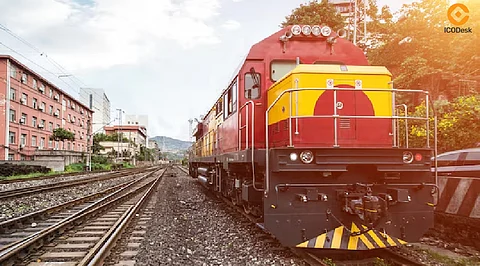

India has signed a 3,000 crore deal to export 150 diesel locomotives to the Republic of Guinea. The locomotives will support the Guinean Simandou iron ore project, a significant development of the region's mining and logistics infrastructure.
The locomotives will be produced at the Marhowrah Diesel Locomotive Factory in the state of Bihar in a joint venture between Indian Railways and US-based Wabtec. The contract will see the release of the tape on the Evolution Series ES43ACmi locomotives over three years. Based on the delivery records, it is expected that 37 units will be delivered during the current financial year, 82 units the following year, and 31 units in the last year.
Every locomotive has a 4500 HP engine and is equipped with AC propulsion technology, regenerative brakes, and microprocessors. These vehicles are designed to operate in harsh conditions and to carry large loads. The single-cab locomotives can operate in pairs, up to 100 wagons at a time, and they are fitted with Distributed Power Wireless Control Systems to achieve synchronized movement.
The Marhowrah plant opened its doors in 2015 and now holds an increasingly important place in the international railway construction sector. The factory has been producing locomotives that meet the requirements of the global market since 2018, having manufactured over 700 locomotives. The facility also features three types of tracks: broad gauge, standard gauge, and Cape gauge, allowing for testing and specific purpose manufacturing for various export markets.
Wabtec engineers had traveled to Guinea to assess the terrain and climate before finalizing the specifications of the locomotives. These modifications involve weatherproof systems and adjustments to standard-gauge tracks. They meet international emission standards and feature crew accommodations, including air-conditioned cabs, fire detection systems, waterless toilets, and onboard facilities such as microwaves and refrigerators.
The plant in Bihar employs 285 people directly and indirectly, with over 1,200 people benefiting from the operation. The joint venture employs over 2,100 people across India, who work in various capacities within the larger venture. The export agreement, on the one hand, enhances not only India's presence in the international loco market but also represents the government's attention to encouraging local production within the Make in India program.
That transaction is part of the larger India-Africa collaboration, which promotes the creation of infrastructure in open-source areas, such as West Africa. With Guinea developing massive mining industries, this collaboration will help Guinea improve its transportation systems, thereby enhancing India's reputation as a potential technological partner.